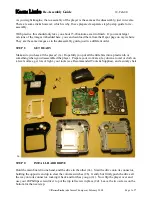
Glossary
HD (High Definition)
- Used to describe video content that is in one of the high definition
video formats. These are broadly 720i/p and 1080i/p. The 720 or 1080 refers to the number of
horizontal lines used to define the picture and the “i” and “p” refer to “interlaced” or
“progressive scan”. Ordinary, “SD / Standard Definition” TV used 576 lines (PAL standard).
Full-HD
- HD television standard for 1080p quality video, with 1080 horizontal lines.
HD Ready
- HD television standard for 720p quality video, with 720 horizontal lines.
Composite (CVBS)
- Low quality analogue video signal format. Can carry PAL signal.
Component (YPbPr)
- Higher quality analogue video signal format. Splits the video signal
into three components to maintain signal clarity and capable of carrying high definition video
up to 1080p. Component is rapidly being phased out in favour of digital video via HDMI.
HDMI
: High Definition Multimedia Interface. A specification developed by the HDMI Working
Group that combines multi-channel audio and high definition video and that controls signals
into a single digital interface for use with DVD players, digital television, and other audiovisual
devices.
Aspect ratio
: The ratio of vertical and horizontal sizes of a displayed image. The horizontal vs.
vertical ratio of conventional TVs is 4:3, and that of widescreens is 16:9.
Disc menu
: A screen display prepared for allowing selection of images, sounds, subtitles,
multi-angles, etc recorded on a DVD.
JPEG
: A very common digital still picture format. A still-picture data compression system
proposed by the Joint Photographic Expert Group, which features small decrease in image
quality in spite of its high compression ratio.
XviD
: MPEG-4 based video compression technology, that can shrink digital video to sizes small
enough to be transported over the internet, while maintaining high visual quality.
H.264
: is a next-generation video compression format. H.264 is also known as MPEG-4 AVC.
Developed for use in high definition systems such as HDTV, Blu-ray as well as low resolution
portable devices, H.264 offers better quality at lower file sizes than both MPEG-2 and MPEG-4
ASP (DivX or XviD). H.264 is sometimes referred (erroneously) as x264 – x264 is the name of
a popular freeware encoder for the H.264 format. H.264 is also sometimes referred to as MP4,
again this is technically incorrect. MP4 is a container format much like AVI or MKV and it can
be used to “house” many different types of compression codecs, not just H.264.
Container.
The multimedia container file is used to identify and interleave different data
types. Simpler container formats can contain different types of audio codecs, while more
advanced container formats can support multiple audio and video streams, subtitles,
chapterinformation, and meta-data (tags) — along with the synchronization information
needed to play back the various streams together. There are many container formats, such as
AVI, Matroska (MKV), MOV, MP4, OGM, WAV, etc.
Analog:
Sound that has not been turned into numbers. Analog sound varies, while digital
sound has specific numerical values. These jacks send audio through two channels, the left and
right.
43




































